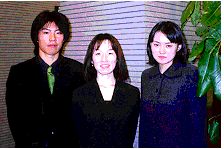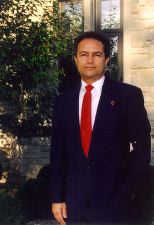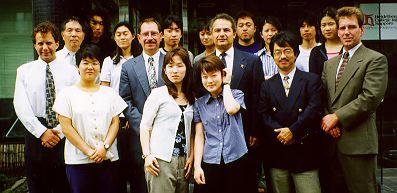

HCJ students and staff enjoyed a typical American turkey dinner at the end-of-term party on December 11, 1998. It was held at Cafe American, and Chef Bradley Callaghan said, "Several English-speaking groups have had parties here, but this is one of the few where everyone could actually speak English!"Meanwhile, many of the HCJ alumni enjoyed their first Thanksgiving dinner in the U.S. Toshiyuki Hatta, who is at Heidelberg College in Ohio, said, "I ate turkey during Thanksgiving. I was surprised [at] such a big piece of meat. I've never seen such a big piece of meat!" Kazumi Yoshida, who is studying in Washington state, wrote, "I had pretty good Thanksgiving day. I went to an American friend's house. But I don't think turky is good. BUT potatoes and granberry [sic] were good. Oh, pumpkin pie was also nice." They both miss Japanese food.
Both Mayu Kaneko and Ayako Tabusa got over 500 on the official TOEFL and went to the U.S. in January. Mayu received a scholarship to Heidelberg in Ohio, and Ayako is at Santa Barbara Community College.
 Satoshi Toramatsu (left), Ayako Tabusa (center), and Mayu Kaneko (right)--all 2nd year students at HCJ--entered the 30th Annual Sapporo-Portland Sister City Oratorical Contest on Saturday, November 7th. Mayu's Topic was "Money can buy happiness?" Ayako's topic was "Lending a Helping Hand." Satoshi's topic was "'Cause Everybody Does It." Ayako won the special award presented by the Junior Chamber of Commerce. According to C.A. Edington, ESL Director and speech coach, "All three students were impressive in their delivery, speaking with confidence, loud clear voices, and natural expression and intonation."
Satoshi Toramatsu (left), Ayako Tabusa (center), and Mayu Kaneko (right)--all 2nd year students at HCJ--entered the 30th Annual Sapporo-Portland Sister City Oratorical Contest on Saturday, November 7th. Mayu's Topic was "Money can buy happiness?" Ayako's topic was "Lending a Helping Hand." Satoshi's topic was "'Cause Everybody Does It." Ayako won the special award presented by the Junior Chamber of Commerce. According to C.A. Edington, ESL Director and speech coach, "All three students were impressive in their delivery, speaking with confidence, loud clear voices, and natural expression and intonation."
For the text of Ayako's speech and information about former winners, see Speech Contest.

On July 24th President Richard H. Owens of Heidelberg College in Tiffin, Ohio, visited the HCJ ESL Program in Sapporo. With him were Vice President Kenneth Porada and Dr. James P. Cross, the Associate Vice President for Global Education and Programs. Before visiting HCJ, they had been to China to establish a Heidelberg program there.
Below is a photo of Dr. Owens (center), Dr. Porada, and Dr. Cross with the Heidelberg students and Mr. Hashimoto, Director of the Japan Entertainment Business Senmon Gakkoo with which HCJ is affiliated.

Students | Alumni | Faculty | Events | Latest News | HCJ Home Page